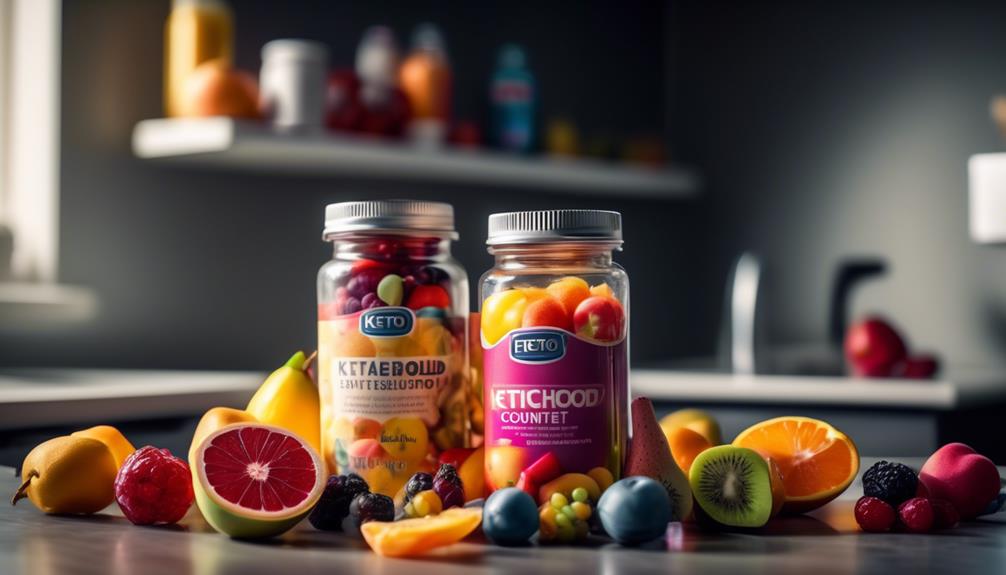Did you know that the average American consumes about 17 teaspoons of added sugar per day? That's a staggering amount, considering the recommended daily intake is no more than 6 teaspoons for women and 9 teaspoons for men.
If you're following a keto diet and looking to cut down on your sugar intake, there are plenty of zero-calorie sugar substitutes available. But which ones are the best?
In this discussion, we'll explore the top zero-calorie sugar substitutes that are perfect for your keto lifestyle, allowing you to enjoy sweetness without compromising your goals.
So, let's dive in and discover the perfect sugar substitute that suits your taste buds and keeps you on track with your keto journey.
Stevia

Stevia is a popular zero-calorie sugar substitute that's commonly used on the keto diet. It has gained popularity due to its natural origin and its ability to sweeten food and beverages without adding any calories. One of the key advantages of stevia is its taste. Many people find that stevia has a sweet, pleasant flavor that closely resembles sugar. Unlike artificial sweeteners, stevia doesn't have a bitter aftertaste, making it a preferred choice for those looking to reduce their sugar intake.
Aside from its taste, stevia also offers a range of health benefits. Studies have shown that stevia may help to lower blood sugar levels, making it a suitable option for people with diabetes or those who are following a low-carb diet like keto. Additionally, stevia has been found to have antioxidant and anti-inflammatory properties, which may help protect against chronic diseases such as heart disease and cancer.
Erythritol
Erythritol, a popular sugar substitute on the keto diet, offers a sweet taste without the added calories. This zero-calorie sweetener is naturally found in some fruits and fermented foods. One of the notable health benefits of erythritol is that it doesn't raise blood sugar levels, making it suitable for those following a low-carb or diabetic diet. Additionally, erythritol is well-tolerated by most people and doesn't have a laxative effect, unlike other sugar alcohols. Its low glycemic index and minimal impact on blood sugar make it a favorite among individuals looking to maintain stable insulin levels.
When it comes to cooking with erythritol, it can be used in a variety of ways. It measures cup for cup like sugar, making it easy to substitute in recipes. Erythritol can be used in baking to make low-carb desserts, such as cakes, cookies, and muffins. It also dissolves well in hot and cold beverages, making it a suitable replacement for sugar in coffee, tea, and smoothies. However, it's important to note that erythritol doesn't caramelize like sugar, so it may not be the best choice for certain recipes that require browning or caramelization.
Monk Fruit Extract

Monk Fruit Extract is a natural sugar substitute that offers a sweet taste without the added calories. It's derived from the monk fruit, also known as Luo Han Guo, which is native to China and Thailand. This extract is becoming increasingly popular as a natural sweetener, especially among those following a keto diet.
Here are some health benefits of monk fruit extract:
- It's calorie-free: Monk fruit extract contains natural compounds called mogrosides, which provide sweetness without adding any calories to your diet. This makes it an excellent choice for those looking to reduce their calorie intake.
- It has a low glycemic index: Unlike regular sugar, monk fruit extract doesn't cause a spike in blood sugar levels. It has a low glycemic index, making it a suitable option for people with diabetes or those watching their blood sugar levels.
- It's rich in antioxidants: Monk fruit extract contains powerful antioxidants called cucurbitacins. These antioxidants help protect your cells from damage caused by harmful free radicals, reducing the risk of chronic diseases.
Monk fruit extract is a natural sweetener that offers several health benefits. It can be used in a variety of recipes and is a great option for those looking to reduce their sugar intake while still enjoying a sweet taste.
Allulose
Allulose, a zero-calorie sugar substitute, is gaining popularity among those following a keto diet. It's a natural sugar found in small amounts in certain fruits, such as figs and raisins. Allulose has a similar taste and texture to regular sugar, making it a great option for those looking to satisfy their sweet tooth while keeping their carb intake low.
One of the main reasons why allulose is favored by those on a keto diet is that it has minimal impact on blood sugar levels. Unlike regular sugar, allulose doesn't raise blood glucose or insulin levels, making it suitable for people with diabetes or those trying to maintain a state of ketosis.
In addition to being keto-friendly, allulose also offers some health benefits. Research suggests that it may help with weight management by reducing calorie intake and promoting fat burning. Moreover, allulose has been shown to have a prebiotic effect, supporting the growth of beneficial gut bacteria.
When using allulose in your keto-friendly recipes, it's important to note that it's about 70% as sweet as regular sugar. Adjustments may be needed to achieve the desired level of sweetness. It's also worth mentioning that while allulose is generally safe to consume, some individuals may experience gastrointestinal side effects such as bloating or diarrhea when consumed in large quantities.
Xylitol

Xylitol is a sugar substitute that offers several health benefits. It has a low glycemic index, making it suitable for those following a keto diet.
Xylitol also has antibacterial properties and may help prevent tooth decay.
Health Benefits of Xylitol
Using a natural sugar substitute can be a beneficial addition to your keto diet. Xylitol, a popular sugar substitute, offers several health benefits that make it an attractive choice. Here are some reasons why xylitol stands out among other sugar substitutes:
- Dental Health: Xylitol has been shown to reduce the risk of tooth decay and promote oral health. It inhibits the growth of harmful bacteria in the mouth and prevents plaque formation.
- Low Glycemic Index: Xylitol has a glycemic index of 7, making it suitable for those following a low-carb or keto diet. It has minimal impact on blood sugar levels.
- Fewer Health Risks: Xylitol is generally safe for consumption and has fewer health risks compared to other sugar substitutes like aspartame or saccharin.
With its dental benefits, low glycemic index, and minimal health risks, xylitol can be a valuable addition to your keto diet.
Xylitol as a Sugar Substitute
When it comes to finding a sugar substitute for your keto diet, one option that stands out among the rest is xylitol. Xylitol is a natural sweetener that has zero calories and a similar taste to sugar. It's derived from plants and can be used in baking, cooking, and as a sweetener for beverages.
Xylitol also offers some dental benefits. It has been shown to reduce the risk of tooth decay by inhibiting the growth of bacteria in the mouth. Additionally, xylitol stimulates saliva production, which helps neutralize acids and remineralize teeth.
However, it's important to note that consuming excessive amounts of xylitol can lead to digestive issues, such as diarrhea and bloating. As with any sugar substitute, moderation is key.
Sucralose
Sucralose is a zero-calorie sugar substitute that offers a sweet taste without the added carbohydrates or calories. It's commonly used in a variety of foods and beverages to provide a sugar-like flavor.
Studies have shown that sucralose is safe for consumption and doesn't have any negative effects on blood sugar levels, making it a suitable option for those following a keto diet.
Taste of Sucralose
Sucralose, a popular zero-calorie sugar substitute, is known for its unique taste. When it comes to taste preferences, some people find that sucralose has a slightly artificial or chemical aftertaste. However, many individuals enjoy the sweet and sugary flavor that it adds to their keto friendly recipes.
Here are a few things to keep in mind about the taste of sucralose:
- Sucralose has a sweetness that's about 600 times stronger than regular sugar, so a little goes a long way.
- It doesn't have a bitter taste like some other sugar substitutes.
- Some people might find that sucralose tastes similar to sugar, while others perceive a slight difference.
Health Benefits of Sucralose
If you're interested in the health benefits of sucralose, you'll be pleased to know that this zero-calorie sugar substitute offers a range of advantages.
Sucralose has been found to have no effect on blood sugar levels, making it a suitable option for individuals following a keto diet or managing diabetes. Unlike other artificial sweeteners, such as aspartame or saccharin, sucralose isn't broken down by the body and is excreted unchanged. This means that it doesn't contribute any calories to your diet.
Additionally, studies have shown that sucralose doesn't have any significant negative health effects or pose any risks to human health when consumed in moderate amounts. However, it's important to note that excessive consumption of sucralose may lead to gastrointestinal issues in some individuals.
Aspartame

Aspartame, a popular zero-calorie sugar substitute, is commonly used in the keto diet. It's important to consider the health concerns associated with aspartame and compare it with other sugar substitutes. Here are some key points to keep in mind:
- Health concerns of aspartame:
- Some studies suggest that aspartame may have negative effects on health, such as headaches, dizziness, and digestive issues. However, these effects are typically seen in individuals with a specific sensitivity to aspartame.
- Aspartame contains phenylalanine, which can be harmful to individuals with phenylketonuria (PKU), a rare genetic disorder. People with PKU should avoid aspartame and opt for other sugar substitutes.
- There have been concerns about the potential link between aspartame and cancer. However, extensive research hasn't found any conclusive evidence to support this claim.
- Comparison of aspartame and other sugar substitutes:
- Aspartame is about 200 times sweeter than sugar, making it a popular choice for those looking to reduce their sugar intake without sacrificing taste.
- Unlike some other sugar substitutes, such as stevia or erythritol, aspartame doesn't have a bitter aftertaste.
- Aspartame is heat-stable, which means it can be used in cooking and baking without losing its sweetness.
Saccharin
Saccharin is a zero-calorie sugar substitute that provides sweetness without adding calories to your keto diet. It has been used for decades as a sugar alternative and is considered safe for consumption by regulatory agencies around the world.
While concerns about its safety were raised in the past, extensive research has shown that saccharin isn't linked to adverse health effects in humans when consumed in moderate amounts.
Sweetness Without Calories
Enjoy the guilt-free sweetness of saccharin, a zero-calorie sugar substitute that adds flavor to your keto diet. Saccharin is one of the oldest artificial sweeteners and has been used as an alternative to sugar for decades.
Here are three reasons why saccharin is a great choice for your keto lifestyle:
- Zero calories: Saccharin provides the sweet taste you crave without adding any calories to your diet, making it perfect for those following a low-carb or ketogenic diet.
- High sweetness intensity: Saccharin is about 300 times sweeter than sugar, so you only need a small amount to achieve the desired sweetness in your recipes or beverages.
- Stable under heat: Unlike some other artificial sweeteners, saccharin remains stable even when exposed to high temperatures, making it suitable for baking and cooking.
With saccharin, you can enjoy the sweetness you love without compromising your keto goals.
Safety and Health Concerns
When considering the safety and health concerns of saccharin, it's important to understand the scientific research surrounding this artificial sweetener. Saccharin is one of the oldest sugar substitutes and has been widely used for decades.
Studies have shown that saccharin doesn't contribute any calories to the diet, making it a popular choice for those following a keto diet or looking to lose weight. However, there have been some concerns regarding the potential side effects of saccharin.
Animal studies have suggested a possible link between saccharin consumption and bladder cancer, but these findings haven't been replicated in humans. The FDA has determined that saccharin is safe for consumption, but it's always recommended to use sugar substitutes in moderation and consult with a healthcare professional if you have any specific health concerns.
Neotame

Neotame, a zero-calorie sugar substitute, is a highly potent sweetener that can be used in various food and beverage products. It offers a sweet taste without the added calories, making it a popular choice for those following a keto diet.
Here are some important details about Neotame:
- Neotame uses:
- Neotame can be used as a tabletop sweetener to replace sugar in coffee, tea, and other beverages.
- It's commonly used in baked goods, desserts, and confectionery products to provide sweetness without the added calories.
- Neotame is also found in various processed foods, including diet sodas, yogurts, and sugar-free snacks.
- Neotame side effects:
- According to the FDA, Neotame is safe for consumption and doesn't pose any health risks when used in normal quantities.
- Some individuals may have a sensitivity to Neotame and experience headaches, dizziness, or digestive issues. If you experience any adverse effects, it's recommended to discontinue use and consult a healthcare professional.
- Pregnant women and children should consume Neotame in moderation and follow the recommended daily intake guidelines.
Advantame
Continuing our exploration of zero-calorie sugar substitutes for the keto diet, let's now shift our focus to Advantame.
Advantame is a high-intensity artificial sweetener that provides the sweetness of sugar without the calories. One of the key advantages of Advantame is its safety profile. Extensive research has been conducted to evaluate its safety, and regulatory authorities around the world, including the FDA and EFSA, have concluded that Advantame is safe for consumption.
When it comes to taste, Advantame offers a sweet flavor that closely resembles sugar. It has a clean, crisp taste without any bitter aftertaste, making it an appealing option for those following a keto diet. It can be used to sweeten various foods and beverages, including coffee, tea, and baked goods, without compromising the taste.
It's important to note that Advantame is significantly sweeter than sugar, so you'll need to use a smaller amount to achieve the desired level of sweetness. Additionally, while Advantame is heat-stable, it may lose some of its sweetness at high temperatures, so it's best suited for recipes that don't require prolonged heating.
Tagatose

Tagatose is a naturally occurring sugar substitute that's low in calories and suitable for the keto diet. It's derived from lactose, which is found in dairy products, but has a taste similar to regular sugar. Here are some health benefits of tagatose:
- Low glycemic index: Tagatose has a glycemic index of 3, which is much lower than regular sugar. This means it has a minimal impact on blood sugar levels, making it a great option for those following a keto diet.
- Prebiotic properties: Tagatose acts as a prebiotic, promoting the growth of beneficial bacteria in the gut. This can help improve digestion and support overall gut health.
- Dental health: Unlike regular sugar, tagatose doesn't promote tooth decay. It doesn't provide fuel for the bacteria in the mouth that produce acid, which can erode tooth enamel.
In terms of taste, tagatose is often described as having a clean and sweet flavor, similar to sugar, with no bitter aftertaste. It can be used in a variety of recipes as a substitute for sugar, including in beverages, baked goods, and desserts.
Inulin
Inulin is a dietary fiber that can be used as a sugar substitute on the keto diet. It's a type of soluble fiber found in many plants, particularly in chicory root. Inulin has gained popularity in recent years due to its health benefits and its ability to provide sweetness without adding calories or spiking blood sugar levels.
One of the key health benefits of inulin is its ability to promote gut health. It acts as a prebiotic, which means it serves as food for the beneficial bacteria in your gut. This can help improve digestion, boost immune function, and reduce the risk of certain diseases.
In addition to its health benefits, inulin can also be used in baking as a sugar substitute. It can add sweetness to baked goods without contributing to the carbohydrate content, making it a suitable option for those following a keto diet. Inulin can be used in cookies, cakes, and even bread recipes to provide a subtle sweetness and improve texture.
Conclusion
In conclusion, when following a keto diet, it's important to choose sugar substitutes that are zero-calorie and won't impact your blood sugar levels. Stevia, erythritol, monk fruit extract, allulose, and xylitol are all great options to satisfy your sweet cravings while staying in ketosis.
Interestingly, a study found that using sugar substitutes can lead to a significant reduction in calorie intake, with participants consuming 20-30% fewer calories compared to those who consumed regular sugar.







